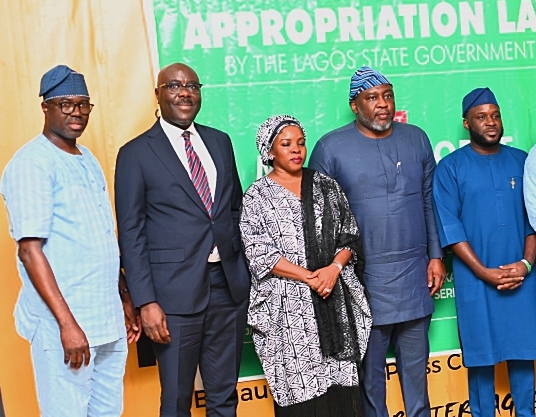Lagos State government has allocated N550.689 billion to development and maintenance of infrastructure in the state in the 2024 budget.
The Commissioner for Economic Planning and Budget, Ope George, at State 2024 Budget Analysis at the Bagauda Kaltho Press Centre, Alausa-Ikeja, highlighted that the N550.689 billion allocation for infrastructure represents 24.28 per cent of the entire budget, noting that it is part of the ₦1.315 trillion capital budget for the year.
Highlighting some of the infrastructure target in the Budget, Ope George said that there would be continuation of ongoing transportation projects, such as the expansion of the rail network, road construction, completion of the Blue and Red Lines, and other metro projects within the State.
The Commissioner said the Budget would also address development of affordable housing schemes and urban renewal projects in addressing the housing deficit in the State by injecting a total of N55.924billion representing 2.5percent of the entire Budget. Some of the social housing projects include Completion of 444 units of building Projects at Sangotedo Phase ll; Completion of 420 units of building Projects at Ajara, Badagry; Phase Two Construction of 136 units of building Projects at Ibeshe ll, among others.
He added that there would be focus on some “Special Projects: Continuous progress on major infrastructure projects like the Lekki-Epe International Airport, the Omu Creek, Blue and Red lines etc. It should be noted that most of these projects will be prioritized.”
Meanwhile, this year budget according to the Commissioner, intends to complete the front-loaded and ongoing infrastructure (such as the new Massey Children’s hospital, Omu Creek, Opebi-Mende-Ojota Link Bridge, Stadia, Rehabilitation of Public Schools, Lekki-Epe and Lagos-Badagry Expressways etc.) and commence the awaiting Fourth Mainland Bridge that will connect Ikorodu to the Island.
George said, “The State’s commitment and continuous support to agriculture will include increased funding for projects and programmes, comprehensive training programs, and incentives tailored for farmers. Simultaneously, ongoing aid for Micro, Small, and Medium Enterprises (MSMEs) remains a priority to stimulate economic growth and foster job creation.
“The State’s 5-year Agric roadmap stands as a testament to this commitment aiming to bolster support for farmers and enhance our overall food systems. This initiative prompted the State to allocate a total sum of N44.33 billion towards Central Food Security, fostering projects such as the Cattle Feedlot Project, Fish Processing Hub programs, and Wholesale Produce Hub & Market. These endeavors aim to elevate food quality, reduce prices, and optimize the Agricultural sector in the long run.”
In order to boost Human Capital Development through Education and Healthcare, which is of deep interest to the State due to the administration’s belief that a population that is healthy, skilled, and safe, can only convert the opportunities in the State to value. The State has allocated 13.35percent of the total budget to personnel cost in Y2024, an increase of 33percent compared to Y2023. The N180.693 billion in the Education Sector will allow continuous Investment in educational infrastructure, digital skills initiatives, and vocational education, thus enhancing learning opportunities for every child in the State.
George has said that the total budget size of ₦2.267 trillion will be funded from a total revenue estimate of ₦1.880 trillion, comprises of Internally Generated Revenue (IGR): 1.189 trillion; Capital Receipts 94.605 billion and Federal Transfer 596.629 billion, adding that LIRS is expected to contribute 63% (N750 billon) of the projected TIGR, and about 23% (N283.567bn) is expected to be generated by other MDAs of government.
“We shall achieve this by deepening the revenue and increasing the tax net through the deployment of technology, economic intelligence, data gathering and analysis amongst other initiatives. There are huge revenue generating opportunities in the informal sector, including real estates, transportation, and trade, he said.”
He also noted, “The deficit of ₦387.125bn is projected to be funded by a combination of Internal, External Loans and Bond Issuance.”

 Health5 days ago
Health5 days ago
 Entertainment7 days ago
Entertainment7 days ago
 Crime5 days ago
Crime5 days ago
 Education7 days ago
Education7 days ago
 Health7 days ago
Health7 days ago
 Comments and Issues6 days ago
Comments and Issues6 days ago
 Football6 days ago
Football6 days ago
 Latest6 days ago
Latest6 days ago

